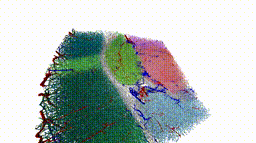# -*- coding: utf-8 -*-
"""
ConvolvePointList
=================
Convolution on a subset of points only.
Paralllel convolution of a kernel at specified points of the source only.
Useful to speed up processing in large arrays and only a smaller number of
convolution points.
Note
----
This module is heavily used in the
:mod"`~ClearMap.ImageProcessing.Skeletonization` algorithm.
"""
__author__ = 'Christoph Kirst <christoph.kirst.ck@gmail.com>'
__license__ = 'GPLv3 - GNU General Pulic License v3 (see LICENSE)'
__copyright__ = 'Copyright © 2020 by Christoph Kirst'
__webpage__ = 'http://idisco.info'
__download__ = 'http://www.github.com/ChristophKirst/ClearMap2'
import numpy as np;
from multiprocessing import cpu_count;
import ClearMap.IO.IO as io
import pyximport;
pyximport.install(setup_args={"include_dirs": [np.get_include()]}, reload_support=True)
import ClearMap.ParallelProcessing.DataProcessing.ConvolvePointListCode as code
###############################################################################
### Convolve point lists
###############################################################################
#TODO: use ArrayProcessing initialization tools
[docs]def convolve_3d(source, kernel, points = None, indices = None, x = None, y = None, z = None, sink = None, sink_dtype = None, strides = None, check_border = True, processes = cpu_count()):
"""Convolves source with a specified kernel at specific points only.
Arguments
---------
source : array
3d binary array to convolve.
kernel : array
Convolution kernel.
points : array
List of points to convolve.
indices : array
Indices to convolve.
x,y,z : array
Arrays of x,y,z coordinates of points to convolve on
sink : array
Optional sink to write result to.
sink_dtype : dtype)
Optional type of the sink. If None, the kernel type is used as default.
strides : array
The strides of the source in case its given as a 1d list.
check_border : bool
If True, check if each kernel element is inside the source array shape.
processes : int or None
Number of processes to use.
Returns
-------
convolved : array
List of results of convolution at specified points
Note
----
Either points x,y,z or an index array needs to be given. This function wraps
more specialized functions
See also
--------
convolve_3d_points, convolve_3d_xyz, convolve_3d_indices
"""
if points is not None and points.ndim == 1:
indices = points;
points = None;
if points is not None:
return convolve_3d_points(source, kernel, points, sink = sink, sink_dtype = sink_dtype, check_border = check_border, processes = processes);
elif indices is not None:
return convolve_3d_indices(source, kernel, indices, sink = sink, sink_dtype = sink_dtype, check_border = check_border, processes = processes);
elif x is not None and y is not None and z is not None:
return convolve_3d_xyz(source, kernel, x, y, z, sink = sink, sink_dtype = sink_dtype, check_border = check_border, processes = processes);
else:
raise RuntimeError('Positions expected to be given as points, index or x,y,z arrays');
[docs]def convolve_3d_points(source, kernel, points, sink = None, sink_dtype = None, check_border = True, processes = cpu_count()):
"""Convolves source with a specified kernel at specific points only
Arguments
---------
source : array
3d binary array to convolve.
kernel : array
Convolution kernel.
points : array
List of points to convolve.
sink : array
Optional sink to write result to.
sink_dtype : dtype)
Optional type of the sink. If None, the kernel type is used as default.
check_border : bool
If True, check if each kernel element is inside the source array shape.
processes : int or None
Number of processes to use.
Returns
-------
convolved : array
List of results of convolution at specified points
"""
if source.dtype == bool:
d = source.view('uint8');
else:
d = source;
npts = points.shape[0];
if sink is None:
if sink_dtype is None:
sink_dtype = kernel.dtype;
sink = np.zeros(npts, dtype = sink_dtype);
if sink.shape[0] != npts:
raise RuntimeError('The sinkput has not the expected size of %d but %d' % (npts, sink.shape[0]));
if sink.dtype == bool:
o = sink.view('uint8');
else:
o = sink;
if kernel.dtype == bool:
k = np.array(kernel, 'uint8');
else:
k = kernel;
if processes is None:
processes = cpu_count();
if check_border:
code.convolve_3d_points(d, k, points, o, processes);
else:
code.convolve_3d_points_no_check(d, k, points, o, processes);
return sink;
[docs]def convolve_3d_xyz(source, kernel, x, y, z, sink = None, sink_dtype = None, check_border = True, processes = cpu_count()):
"""Convolves source with a specified kernel at specific points only
Arguments
---------
source : array
3d binary array to convolve.
kernel : array
Convolution kernel.
x,y,z : array
Arrays of x,y,z coordinates of points to convolve on
sink : array
Optional sink to write result to.
sink_dtype : dtype)
Optional type of the sink. If None, the kernel type is used as default.
check_border : bool
If True, check if each kernel element is inside the source array shape.
processes : int or None
Number of processes to use.
Returns
-------
convolved : array
List of results of convolution.
"""
if source.dtype == bool:
d = source.view('uint8');
else:
d = source;
npts = len(x);
if sink is None:
if sink_dtype is None:
sink_dtype = kernel.dtype;
sink = np.zeros(npts, dtype = sink_dtype);
if sink.shape[0] != npts or len(y) != npts or len(z) != npts:
raise RuntimeError('The sinkput has size %d and does not match the x,y,z coordinates of sizes: %d = %d = %d' % (sink.shape[0], len(x), len(y), len(z)));
if sink.dtype == bool:
o = sink.view('uint8');
else:
o = sink;
if kernel.dtype == bool:
k = np.array(kernel, 'uint8');
else:
k = kernel;
if processes is None:
processes = cpu_count();
if check_border:
code.convolve_3d_xyz(d, k, x, y, z, o, processes);
else:
code.convolve_3_xyz_no_check(d, k, x, y, z, o, processes);
return sink;
[docs]def convolve_3d_indices(source, kernel, indices, sink = None, sink_dtype = None, strides = None, check_border = True, processes = cpu_count()):
"""Convolves source with a specified kernel at specific points given by a flat array index.
Arguments
---------
source : array
3d binary array to convolve.
kernel : array
Convolution kernel.
indices : array
Indices to convolve.
sink : array
Optional sink to write result to.
sink_dtype : dtype)
Optional type of the sink. If None, the kernel type is used as default.
strides : array
The strides of the source in case its given as a 1d list.
check_border : bool
If True, check if each kernel element is inside the source array shape.
processes : int or None
Number of processes to use.
Returns
-------
convolved : array
List of results of convolution.
"""
d = source.reshape(-1, order = 'A');
if source.dtype == bool:
d = d.view('uint8');
npts = indices.shape[0];
if sink is None:
if sink_dtype is None:
sink_dtype = kernel.dtype;
sink = np.zeros(npts, dtype = sink_dtype);
if sink.shape[0] != npts:
raise RuntimeError('The sinkput has not the expected size of %d but %d' % (npts, sink.shape[0]));
if sink.dtype == bool:
o = sink.view('uint8');
else:
o = sink;
if kernel.dtype == bool:
k = np.array(kernel, 'uint8');
else:
k = kernel;
if processes is None:
processes = cpu_count();
if strides is None:
strides = np.array(io.element_strides(source));
#print d.dtype, strides.dtype, kernel.dtype, o.dtype
if check_border:
code.convolve_3d_indices(d, strides, k, indices, o, processes);
else:
code.convolve_3d_indices_no_check(d, strides, k, indices, o, processes);
return sink;
[docs]def convolve_3d_indices_if_smaller_than(source, kernel, indices, max_value, sink = None, strides = None, check_border = True, processes = cpu_count()):
"""Convolves source with a specified kernel at specific points given by a flat array indx under conditon the value is smaller than a number
Arguments
---------
source : array
3d binary array to convolve.
kernel : array
Convolution kernel.
indices : array
Indices to convolve.
max_value : float
Checks if the convolution result is smaller than this value.
sink : array
Optional sink to write result to.
strides : array
The strides of the source in case its given as a 1d list.
check_border : bool
If True, check if each kernel element is inside the source array shape.
processes : int or None
Number of processes to use.
Returns
-------
convolved : array
List of results of convolution at specified points
"""
d = source.reshape(-1, order = 'A');
if source.dtype == bool:
d = d.view('uint8');
npts = indices.shape[0];
if sink is None:
sink = np.zeros(npts, dtype = bool);
if sink.shape[0] != npts:
raise RuntimeError('The sinkput has not the expected size of %d but %d' % (npts, sink.shape[0]));
if sink.dtype == bool:
o = sink.view('uint8');
else:
o = sink;
if kernel.dtype == bool:
k = np.array(kernel, dtype = 'uint8');
else:
k = kernel;
if processes is None:
processes = cpu_count();
if strides is None:
strides = np.array(io.element_strides(source), dtype=int);
#print d.dtype, strides.dtype, kernel.dtype, o.dtype
if check_border:
print(d.dtype, strides.dtype, k.dtype, indices.dtype, np.array(max_value).dtype, o.dtype)
code.convolve_3d_indices_if_smaller_than(d, strides, k, indices, max_value, o, processes);
else:
code.convolve_3d_indices_if_smaller_than_no_check(d, strides, k, indices, max_value, o, processes);
return sink;
[docs]def convolve_3d_find_smaller_than(source, search, indices, max_value, sink = None, processes = cpu_count()):
"""Convolves source with a specified kernel at specific points given by a flat array indx under conditon the value is smaller than a number
Arguments:
source (array): 3d binary array to convolve
kernel (array): binary orinteger kernel to convolve
points (array): list of points to convolve given by the flat array coordinates
max_value (int): if result of convolution is smaller then this value return True otherwise False in the sink array
processes (int): number of processors
Returns:
array: list of results of convolution at specified points
Note:
cython does not support bools -> use view on uint8 as numpy does
"""
d = source.reshape(-1, order = 'A');
if source.dtype == bool:
d = d.view('uint8');
npts = indices.shape[0];
if sink is None:
sink = np.zeros(npts, dtype = int);
if sink.shape[0] != npts:
raise RuntimeError('The sinkput has not the expected size of %d but %d' % (npts, sink.shape[0]));
if sink.dtype == bool:
o = sink.view('uint8');
else:
o = sink;
if processes is None:
processes = cpu_count();
code.convolve_3d_find_smaller_than(d, search, indices, max_value, o, processes);
return sink;
###############################################################################
### Tests
###############################################################################
[docs]def test():
import numpy as np
import ClearMap.sourceProcessing.ConvolvePointList as cpl
from importlib import reload
reload(cpl);
reload(cpl.code);
#source = np.random.rand(2000,1000,1000) > 0.5;
source = np.random.rand(100,100,500) > 0.5;
source[[0,-1],:,:] = 0;
source[:,[0,-1],:] = 0;
source[:,:,[0,-1]] = 0;
pts = np.where(source);
pts = np.array(pts, dtype = int).T;
#np.save('source.npy', source);
#np.save('points.npy', pts)
from ClearMap.ImageProcessing.Topology.Topology3d import n6
n6i = np.array(n6, dtype = int)
import time;
t0 = time.time();
result = cpl.convolve_3d(source, n6i, pts, processes=24, check_border = True)
t1 = time.time();
print('%f secs' % ((t1-t0)));
import scipy.ndimage
t0 = time.time();
good = scipy.ndimage.filters.convolve(np.array(source, dtype = float), np.array(n6, dtype = float), mode = 'constant', cval = 0)
t1 = time.time();
print('%f secs' % ((t1-t0)));
x,y,z = pts.T
if np.all(good[x,y,z].astype(result.dtype) == result):
print('works')
else:
print('error!')
ptsi = np.where(source.reshape(-1, order = 'A'))[0];
t0 = time.time();
result = cpl.convolve_3d_index(source, n6i, ptsi, processes=24)
t1 = time.time();
print('%f secs' % ((t1-t0)));
x,y,z = pts.T
if np.all(good[x,y,z].astype(result.dtype) == result):
print('works')
else:
print('error!')
ptsi = np.where(source.reshape(-1, order = 'A'))[0];
t0 = time.time();
resultc = cpl.convolve_3d_index_if_smaller_than(source, n6i, ptsi, 3, processes=24)
t1 = time.time();
print('%f secs' % ((t1-t0)));
np.all(resultc == (result < 3))
x,y,z = pts.T
if np.all(good[x,y,z].astype(result.dtype) == result):
print('works');
else:
print('error!');
#import os
#os.remove('source.npy');
#os.remove('points.npy')

 Source
Source


